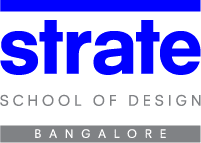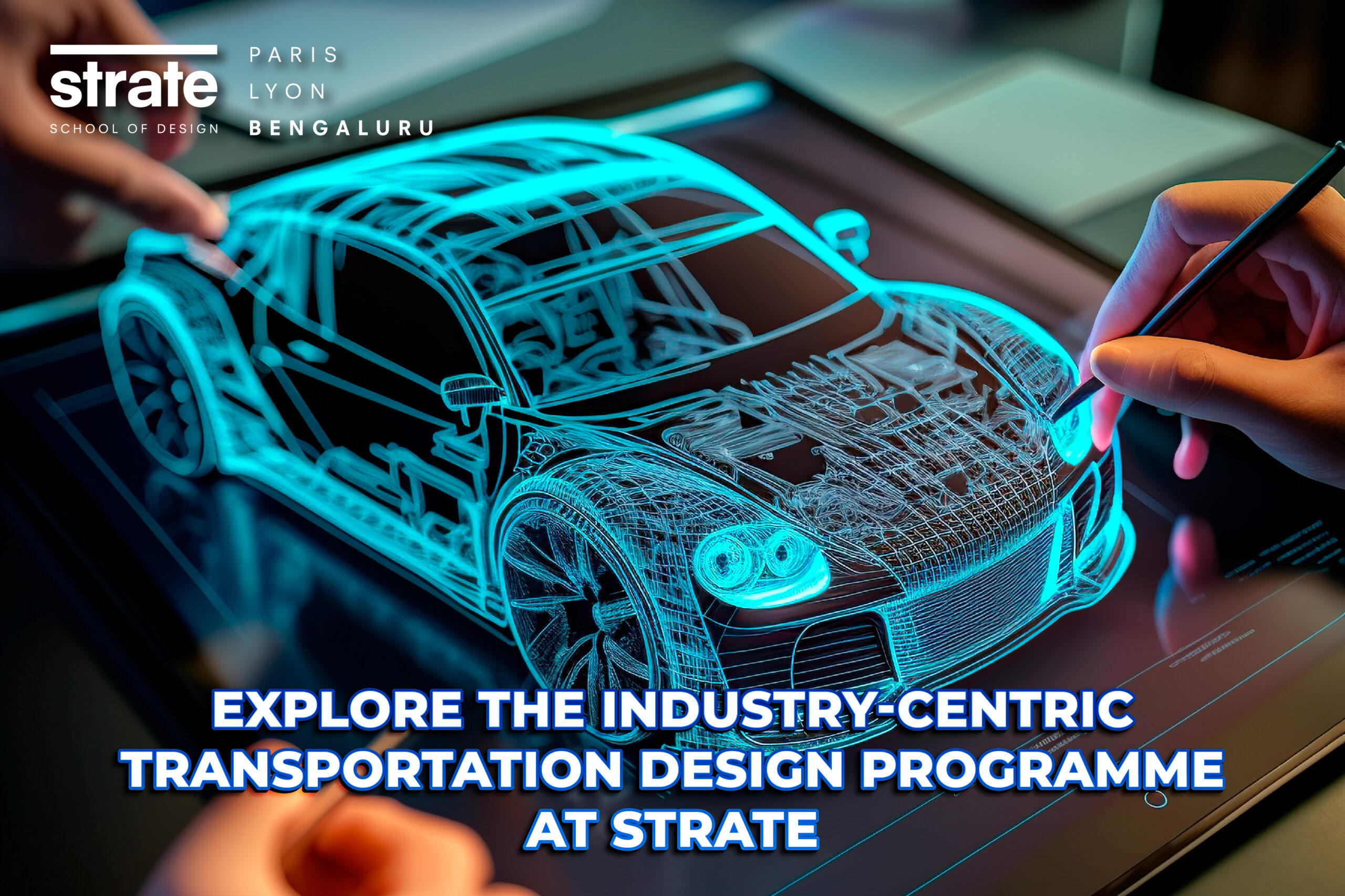Are you aspiring to become a cutting-edge transportation designer? Ambitious to delve into mobility design to pioneer futuristic solutions? Strate School of Design, Bengaluru, offers a dynamic and industry-centric programme in Transportation Design. Including:
a 5-year integrated masters programme,
a 3-year bachelor’s programme, and
a 2-year master’s programme.
Strate’s Transportation Design programme is packed with hands-on experiences in various aspects of design like interior and exterior design, colours and trim, 3D modelling, and digital sketching. The focus is on fostering formal and conceptual excellence in mobility design solutions.
The Strate Pedagogy
Strate’s pedagogy brings on board global vehicle concepts, including:
• A definition of user experience and brand experience linked to the vehicle.
• Bodywork formalizing a visual identity consistent with the brand image, imagination, and trends.
• A passenger compartment, a living space, a driving position, and interface components by providing functional, ergonomic, and aesthetic solutions.
• A definition of atmospheres, colors, materials, and finishes. A designer intervenes in all sectors of activity (whether automobile, public or individual transport, aeronautics, maritime, etc.).
The Transportation Design programme at Strate School of Design is focused on evolving the landscape of mobility design. The design school follows a holistic and immersive approach to learning. The design programme’s key elements include:
Agility and anticipation
This means building a sense of agile learning and understanding in students or mobility design. Their understanding of various contexts and lifestyles and their relationships to mobility.
Navigating evolving concepts:
Strate equips students to be agile and adaptive to the ever-changing world around us. This includes technological advancements, shifts in consumer preferences, and environmental concerns.
Understanding shift:
Students are made to delve deep into the evolving lifestyles. Reflect on how these lifestyle changes impact mobility choices. Further crafting solutions that cater to these dynamic times.
Anticipating future needs:
When students have researched on the evolving concepts and shifts in lifestyle, they are guided to anticipate future mobility needs. Strate offers them proactive support to shape mobility solutions that resonate with emerging trends and preferences.
Scenario planning
Strate students are encouraged to outline relevant mobility scenarios in the context of increasing systemic complexity. This means students work on:
Simplifying complex scenarios:
Strate students get to learn the art of outlining relevant mobility scenarios. This entails them in deep research of the intricate interplay of various factors like urbanization, sustainability, population, etc.
Navigating complexities:
Students are trained to be proactive problem solvers. Strate faculty works with students to devise scenarios that account for various variables and prepare them to address emerging challenges.
Formalize mobility solutions
This aspect essentially involves students designing tangible new experiences of/in mobility by formalizing the object of mobility. This means to design prototypes and test their application in various real-world situations.
Design tangible solutions:
Students learn to craft futuristic design solutions that begin from ideation to execution into a prototype. Strate’s design curriculum emphasizes the transformation of abstract ideas into real-world solutions. Interaction with industry and working on live industry projects becomes an important part of this learning process.
Materialize concepts:
Students embark on a journey to transform their creative concepts and ideation into practical, functional, and aesthetically pleasing mobility designs.
Transform mobility eco-systems
This step is about bringing the different players in the transportation ecosystem to the forefront. Strate aids students in exploring the multifaceted role of a transportation designer in the context of reimagining mobility.
Designers as agents of change:
Transportation designers are not simply the creators of new mobility solutions but also the agents of change in the eco-system. They play the role of a catalyst to bring in the necessary transformation from the industrial or commercial end.
Strate x Tata Motors: Strategic Partnerships at Strate for Transportation Design course
Strate consciously integrates industry partnerships into its core vision. The school recognizes industry collaboration offers critical learning opportunities for its students and enhances their employment prospects. One of Strate’s standout industry collaborations is with Tata Motors that is focused on:
• Fostering innovation and critical thinking to develop smart and intelligent design solutions for futuristic mobility, and
• Develop a curated design curriculum and education programme in India by bridging the industry-academia gap and bringing in industry-level classroom projects.
The aspiring automobile designers at Strate will gain opportunities such as
a. Live industry project opportunities.
b. Build their unique network with a leading global brand.
c. Get introduced to new techniques, skills, and tactics of how the industry approaches mobility-based designs. Its overall challenges and work with a solution-focused approach.
d. Engage in in-depth research for the future of mobility and vehicles – focused on the next big thing.
Strate builds their curriculum design in a manner where networking and industry interventions are key to student learning. Masterclasses, workshops, industry visits, and industry live projects are key tools of intervention in the classroom. Many experts from the Indian design field and international brands become guides and guest speakers at Strate. This helps the school bring global learning to its campus.
International learning
Here are some of the international learning opportunities at Strate:
A two-week global immersion programme. This is an international education visit to Strate Lyon and/or Paris to experience global design systems, interact with international peers and faculty and gain a global industry working style perspective.
Semester exchange. Strate encourages students to gain a global perspective in their design learning process via the opportunity of semester exchange at Strate Lyon and Paris.
International faculty. Up to 20% of the Starte curriculum is taught by international faculty from Strate Paris and Lyon. It also encompasses international industry partners and mentors.
The Strate Transportation Design programme goes beyond car design, it is about reimaging future mobility solutions. Students under this programme get to cross-collaborate with other students from product and interaction design to bring creative solutions to life. Encouraging teamwork and adaptive learning from peers. They also learn to formalize mobility experiences and navigate complex scenarios in the transportation field.
If you aspire to become a transportation designer, to build sustainable and cutting-edge mobility solutions, Starte School of Design, Bengaluru, is your ideal choice. Reach the Strate team for a Q&A session here and read more about the Transportation Design course here.



Want to Become a Designer ?
Strate is a unique design school that nurtures your talents as a designer by offering state-of-the art designing courses in Bangalore.
Join Strate